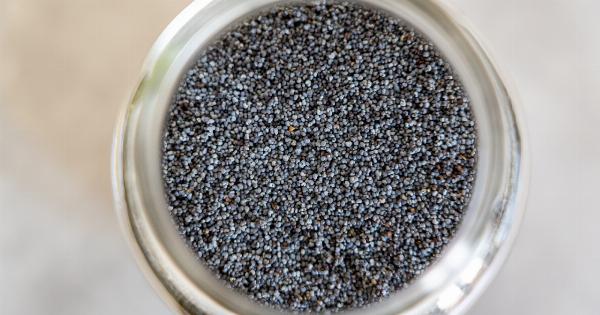Seeds are often overlooked when it comes to healthy eating habits. However, these tiny powerhouses of nutrition can provide numerous health benefits. Adding seeds to your diet is an easy and convenient way to boost your nutrient intake.
The Nutritional Powerhouses of Seeds
1. Chia Seeds.
Chia seeds are packed with nutrients. They are an excellent source of omega-3 fatty acids, which are essential for brain health and reducing inflammation in the body.
Chia seeds are also high in fiber, promoting digestive health and aiding in weight management. Additionally, they are rich in calcium, magnesium, and phosphorus, essential minerals for maintaining strong bones.
2. Flaxseeds.
Flaxseeds are another incredible seed to incorporate into your diet. These tiny seeds are a great source of dietary fiber, which helps regulate blood sugar levels, promote satiety, and support healthy digestion.
Flaxseeds also contain lignans, plant compounds that have been shown to have anti-cancer properties. They are an excellent way to increase your intake of omega-3 fatty acids and can be especially beneficial for those following a plant-based diet.
3. Pumpkin Seeds.
Pumpkin seeds, also known as pepitas, are not just a Halloween snack. These seeds are a nutritional powerhouse. They are an excellent source of magnesium, which plays a crucial role in over 600 biochemical reactions in the body.
Pumpkin seeds are also rich in antioxidants, including vitamin E, which helps protect the body from the damaging effects of free radicals. Additionally, they are a good source of protein and healthy fats.
4. Sunflower Seeds.
Sunflower seeds are a versatile and delicious addition to any diet. They are an excellent source of vitamin E, an antioxidant that helps protect the body’s cells from damage.
Sunflower seeds are also packed with essential minerals, including selenium, which supports a healthy immune system. These seeds are also rich in healthy fats, fiber, and protein, making them a nutritious and filling snack option.
5. Sesame Seeds.
Sesame seeds are tiny but mighty in terms of nutrition. They are an excellent source of copper, calcium, magnesium, and manganese, all essential minerals for maintaining strong bones and supporting various bodily functions.
Sesame seeds are also rich in phytosterols, plant compounds that have cholesterol-lowering effects. Adding sesame seeds to your diet is a great way to boost your nutrient intake and add a nutty flavor to your meals.
Benefits of Including Seeds in Your Diet
1. Excellent Source of Healthy Fats.
Seeds contain a good amount of healthy fats, including omega-3 fatty acids, monounsaturated fats, and polyunsaturated fats. These fats are essential for brain health, reducing inflammation, and promoting heart health.
Incorporating seeds into your diet is an easy and tasty way to increase your intake of these beneficial fats.
2. Rich in Essential Minerals.
Seeds are a fantastic source of essential minerals that are important for overall health. These minerals include magnesium, calcium, phosphorus, and copper, among others.
Adding seeds to your diet can help ensure you meet your daily mineral requirements, which are necessary for bone health, proper muscle function, and various enzymatic reactions in the body.
3. High in Dietary Fiber.
Dietary fiber is crucial for digestive health, maintaining a healthy weight, and preventing chronic diseases such as heart disease and type 2 diabetes. Seeds, such as chia seeds and flaxseeds, are particularly high in fiber.
Incorporating these seeds into your diet can help promote regular bowel movements, control blood sugar levels, and improve overall gut health.
4. Abundance of Antioxidants.
Seeds are rich in antioxidants, which play a crucial role in protecting the body against oxidative stress caused by free radicals.
Antioxidants help reduce inflammation, support a healthy immune system, and may even lower the risk of chronic diseases such as cancer and heart disease. By including a variety of seeds in your diet, you can benefit from their antioxidant properties.
5. Versatile and Easy to Incorporate.
One of the best things about seeds is their versatility. They can be sprinkled on top of salads, added to smoothies, used as a crunchy coating for proteins, or simply enjoyed as a standalone snack.
Incorporating seeds into your diet is simple and effortless, making it a convenient way to enhance the nutritional quality of your meals.
Tips for Incorporating Seeds into Your Diet
Here are some practical tips for adding seeds to your daily meals:.
1. Sprinkle chia seeds or flaxseeds onto your morning cereal or yogurt.
2. Add a handful of pumpkin seeds or sunflower seeds to your trail mix or homemade granola bars.
3. Use sesame seeds as a topping for stir-fries, salads, or roasted vegetables.
4. Include seeds in your baking recipes, such as muffins, bread, or energy bars.
5. Experiment with different seed butters, such as sunflower seed butter or tahini, as a spread for your toast or as an ingredient in dressings and dips.
Conclusion
Seeds are often overlooked but can provide a significant nutritional boost when added to your regular diet. With their abundance of healthy fats, essential minerals, dietary fiber, and antioxidants, seeds offer numerous health benefits.
Incorporate a variety of seeds into your meals for a diverse nutrient profile and enjoy the versatility and convenience they bring to your healthy eating habits.





























